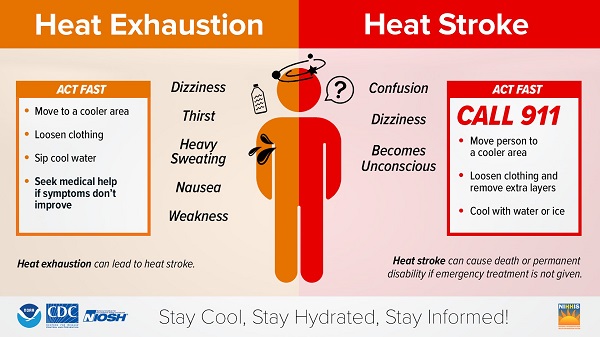Ready NW offers tips for beating the heat this summer
8 min read
Preparedness volunteers from Eugene’s neighborhoods offer tips to beat the heat. From Ready Northwest, Jacque Wurster.
[00:00:06] Jacque Wurster: We are headed into our summer season. So I thought it was important to find out what actually happens to the body as a result of the exposure to extreme heat. And normally the body cools itself by sweating, sometimes sweating just isn’t enough and there’s different factors that could affect a person’s ability to cool themselves and to be able to sweat efficiently.
[00:00:27] When the humidity is high, that sweat doesn’t evaporate as quickly. So your body isn’t able to release the heat as quickly as it should. And then there’s other conditions that can contribute to that, whether it be old age or young age, obesity, fever, dehydration, heart disease, poor circulation, sunburn, certain prescription drugs, and alcohol. Those can all impact somebody’s ability to cool themselves in an effective manner.
[00:00:51] Somebody suffers from a heat related illness when their temperature control system is overloaded and their body temperature rises rapidly. So their body’s not able to cool themselves with the normal processes. So some of these heat related illnesses start to crop up.
[00:01:06] We want to make sure that we’re staying cool and drinking plenty of fluids to prevent any heat related illnesses. We want to try to stay indoors or in cool areas. If you do have to go outside, make sure you’re dressing properly to stay shaded from the sun and try to take breaks often, especially if you’re working outside or doing any heavy labor- intensive tasks.
[00:01:26] And also know who is at high risk for heat stroke and heat exhaustion—- infants, young children, older adults, any people with chronic medical conditions, this could be you or somebody in your house. It could also be some of your immediate neighbors. I know in the event of extreme heat, I need to go over and check on them, even if they don’t ask me to, I need to just go make sure that they’re okay.
[00:01:47] John Q: She described four heat-related conditions: sunburn, heat cramps, heat exhaustion, and heat stroke.
[00:01:54] Jacque Wurster: So we want to know what the signs are of heat stroke, and heat exhaustion, so that we can take action.
[00:01:58] Heat exhaustion could include symptoms like heavy sweating, paleness, muscle cramps, tiredness, weakness, dizziness, headache, maybe an upset stomach maybe vomiting and maybe fainting, but still alert, still conscious, still able to hold out a conversation with somebody.
[00:02:14] If we happen to see somebody in that scenario, we want to get them moved to a cool place. So let’s get them out of the sun, get them out of the heat, however we can.
[00:02:22] Loosen any tight clothes that might be on. If you have a tie or a button up shirt that’s tight, or maybe a collar, or try to help loosen some of that, maybe loosen the waistband, put cool wet cloths on the body, or take a cold bath and sip some water. But we do want to get medical help right away if you start throwing up, if your symptoms get worse, or if your symptoms last for more than one hour.
[00:02:43] And then again, the more extreme version of this would be heat stroke. So that temperature is really escalating. The person could be losing consciousness. Their body stops sweating and things kind of start seem like they’re shutting down a little bit.
[00:02:55] When it really becomes concerning and extreme, your skin actually stops sweating. Your pulse becomes rapid and very strong. The headache escalates to a throbbing headache. You could also have dizziness, upset, stomach confusion, or passing out. So a lot of times people will have an altered state of consciousness. They might be really confused as to what’s happening and not really know that they’re experiencing all of these symptoms. So it’s important to look out for the people that we are with.
[00:03:23] If you notice the person is really starting to become out of it or see having some extreme symptoms, definitely you want to call 9-1-1 right away. Heat stroke is an urgent medical emergency. Try to move that person to a cooler place and you can try to use cool cloth or a cool bath to cool their skin down.
[00:03:39] And then there are also two other heat related illnesses that are a little less extreme.
Heat cramps: And that could be heavy sweating during intense exercise or muscle pain or spasms if you’re out exercising or doing hard labor out in the sun. And how to resolve that, you want to stop physical activity and move to a cool place, drink water or a sports drink to replace the electrolytes, and then wait for those cramps to go away before you continue any physical activity.
[00:04:04] If anything lasts for longer than one hour or you’re on a low sodium diet, or you have heart problems, you want to call maybe 9-1-1, or get medical help right away, depending on how severe that is for you.
[00:04:15] Sunburn: I’m sure everybody has experienced some sunburn at some point in their lives. And really the resolution there is to stay out of sun until your sunburn heals. You can use cool cloths or take a cool bath to help cool your skin down. Use moisturizing motion, like aloe or items that are designed specifically for sunburn, and then don’t ever break the blisters.
[00:04:35] Sunburn affects your body’s ability to cool itself, so it puts you at a higher risk of heat exhaustion and heat stroke, because your skin is already at a heated stage and it has a little extra difficulty cooling.
[00:04:47] If air conditioning is not available in your home, which I think is a lot of people and a lot of homes out here in Eugene, we can contact our health department, or locate an air-conditioned shelter in our area. And I typically see this reported on via the Register-Guard and our local public radio stations.
[00:05:04] John Q: Julie Lambert and Sam Broadway provide updates for KEPW News at 97.3 Eugene Peace Works Radio.
[00:05:11] Jacque Wurster: So some tips for preventing those heat-related illnesses that we just talked about, really the three big themes here are to stay cool, stay hydrated, and stay informed. So we want to practice heat safety, wherever we are. Heat related deaths are typically preventable.
[00:05:27] John Q: Automobiles can heat up quickly.
[00:05:31] Jacque Wurster: A big disclaimer here is that cars get hot fast. So this outside temperature being about 75 degrees Fahrenheit, after about 10 minutes the temperature in a car raises to 94 degrees. After about 20 minutes, that raises to 104 and about 30 minutes, it raises to 109. So the temperature in cars can get hot very, very quickly. We never want to leave children or adults or pets in a car alone. Even if the windows are down, it still gets very hot in there.
[00:06:01] Even if water is provided, that is not enough to keep the person cool. That temperature rising is really going to override any water that you leave for the person. And also don’t overlook any children who may have fallen asleep in the back seat that I think happens, a little more often than anybody would like, but always important to check the back seat.
[00:06:20] Oregon does actually have a Good Samaritan law that anyone—not just law enforcement—can enter a vehicle by force or otherwise to remove an unattended domestic animal without fear of civil or criminal liability.
[00:06:33] So if you notice an animal or a child in distress in a parked car you call 9-1-1. And I have called on this before. Typically they’ll ask me a few questions, like, ‘Do I know where the person is at? Can I go and find that driver?’
[00:06:45] If you determine that more lifesaving action is necessary, you want to make sure you have reasonable belief that they are in imminent danger, you want to notify law enforcement, let them know what your plan is and the severity of the situation, and then you can enter.
[00:06:59] You only want to use the minimum force necessary and then stay with the animal or the person until law enforcement or emergency services arrives.
[00:07:07] John Q: Power outages can also occur in extreme heat.
[00:07:10] Jacque Wurster: So several of us have experienced winter power outages that come along with it being very cold outside, but that same scenario could happen when it’s very hot outside. We can have summertime power outages.
[00:07:22] So food safety during a disaster, we want to make sure we’re keeping the refrigerator and the freezer doors closed as much as possible. Our food will stay safe in a refrigerator for up to four hours without power if you don’t open the door and a full freezer will keep the food safe for about 48 hours without power if you don’t open the door.
[00:07:43] And a preparedness tip that we can do before the disaster is filling some gallon water jugs about three quarters of the way full and putting them in the freezer untapped, because that water’s going to expand when it freezes. So after it freezes, we can then put on the lids and you can keep them in your freezer. When the power might go out, you can move a couple of them to your fridge. And those just act as large ice packs within the fridge and freezer to help extend that length of keeping your food cold a little bit longer.
[00:08:11] So we want to identify any food that may not be safe to eat. So meat, poultry, fish, eggs, any leftovers, anything that has thawed out that was in the freezer, if anything smells weird. Food can still be unsafe, even if it doesn’t have a weird odor or look to it. So we just want to make sure we’re paying attention to that time clock of when the power goes out. ‘When in doubt, throw it out’ is the motto that I have seen all over the Internet. Jerry.
[00:08:36] Jerry: One of the tricks I’ve learned is: Take a small container of water and freeze it and put a coin on top of the frozen water. And then when you get power back, if you find the coin on the bottom, you shouldn’t trust the food. If the coin is still on the top or maybe just halfway, it’s okay to eat that food.
[00:08:58] Jacque Wurster: Ah, that’s a good tip. So, you know, if the water melts it or not based on where the coin is at, I like that. Good tip Jerry. Thanks.
[00:09:04] John Q: Plan ahead to be able to obtain new medications.
[00:09:08] Jacque Wurster: So any medications that require refrigeration in order to keep their strength, we want to check with our doctors and pharmacists ahead of time to ask how long that medication is going to stay good. Or if there’s any backup plans that should be put in place if the power does go out. So they should be able to talk to you about the shelf life of any refrigerated medications.
[00:09:28] And we really want to have that conversation ahead of time. If the power is out, you may not be able to get ahold of a pharmacist or a doctor. A cell phone service may also be out.
[00:09:37] John Q: Ready Northwest with tips for beating the heat.





